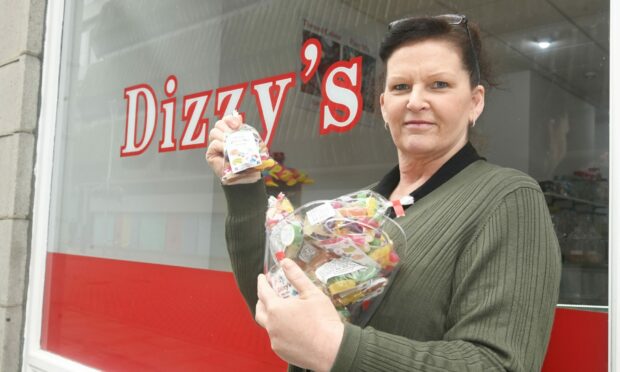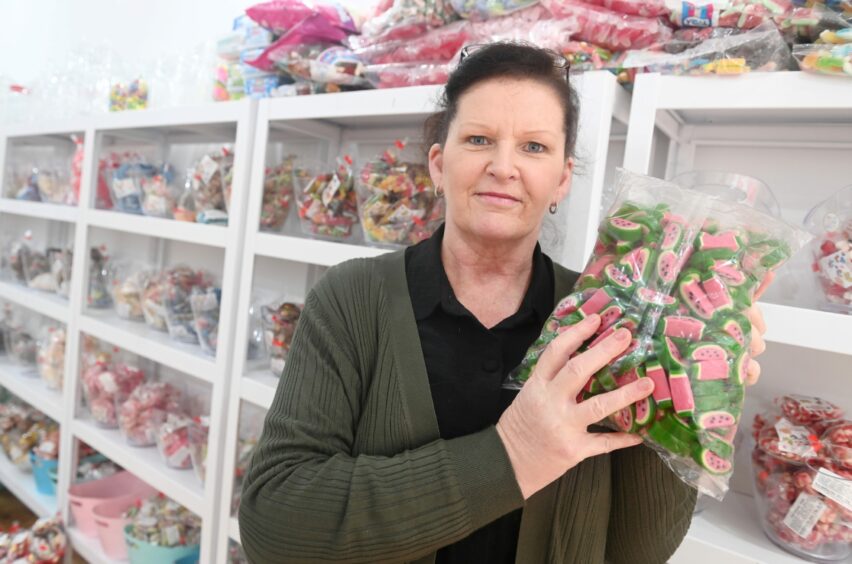An independent retailer has ambitions to grow the business despite facing challenging times on the high street and a major rise in costs next year which could see her on the hunt for new premises.
Lynne McIntyre, owner of Dizzy’s Sweets on Aberdeen’s George Street, is a highly experienced retailer and also ran an evening wear and ballgown shop which closed during the Covid lockdowns.
She hopes to get her dress shop on the Granite City’s Holburn Street back up and running in coming months as her true passion lies with the fashion business, she said, but that sweets are appealing to customers as well as other businesses she supplies in Aberdeen and Peterhead where she is from.
Hard work
“You have to work really hard at the sweets – it is lower profit margins compared to dresses. It has been nothing but work, work, work,” she said.
And while she said her rent for her George Street premises are “reasonable” because the landlord has reduced its charges, after May a suspension on business rates on the property will be lifted which she says will likely be unaffordable.
She believes landlords must reduce rents and the local authority must reduce or remove rates in order for retailers to survive in this market as they struggle to recover from Covid and face a recession.
Having opened Dizzy’s in May she is concerned about what happens when the business rates come into force.
She said: “My takings every day would not survive the normal rent and rates after the year. I have to come out unless I get mega sales, and based on what I know now it isn’t happening.
“It will happen at Christmas time. It is all to do with car parking, footfall, location. I’d love to have a shop on Union Street but I can’t afford it.”
Independent retailers need longer term support
Ms McIntyre, who has owned a number of shops in her career, said retail is “in her blood”. She said a stay on charging business rates on premises was not enough for just a year and there was a need for a longer term view to support independent businesses like hers.
“This Covid situation and all this going on, it has actually crucified people.
“A year is definitely not enough. This is going to take three or four or five years.
“It’s not sustainable for any business unless you are a successful chain store. But when it comes to independent shops they have no chance.”
Inflation ‘wiped out’ rise in sales – report
As she highlighted challenges facing her business, a new report showed Scottish retail sales flatlined in July as a modest rise in their value was wiped out by the impact of record rising inflation.
The latest Scottish Retail Consortium-KPMG Scottish Retail Sales Monitor showed that total sales in Scotland increased by 4.4% compared with July 2021, when they had grown 7.4%.
This was above the three-month average increase of 3.5% and below the 12-month average growth of 15%.
However, when adjusted for inflation, the year-on-year change was 0%.
Ewan MacDonald-Russell, deputy head of the Scottish Retail Consortium, said: “In real terms, Scottish retail sales flatlined in August as a modest rise in the value of sales was wiped out by the impact of record rising inflation.
“Food sales rose by 5.3% as shoppers increased their grocery budgets – but that hides the reality that customers’ pounds are buying fewer products.
“Retailers did see shoppers changing their food shopping to purchase more outdoor food to take advantage of the sunshine – but that was instead of other purchases.
“It was a similar story for high street retailers. Whilst summer clothing and items sold well, that was very much at the expense of other items. It appears customers are laser-focused on what they need at the moment when purchasing.”
The figures showed that Scottish sales last month increased by 2% on a like-for-like basis compared with July 2021, when they had increased by 6.2%.
Total food sales increased by 5.3% versus July 2021, when they had increased by 1.8%, while total non-food sales increased by 3.7% in July compared with July 2021, when they had increased by 12.1%.
Paul Martin, Partner, UK head of retail at KPMG, said: “Scottish consumers continued to spend at the tills in July, despite consumer confidence polls being at an all-time low. Scots were determined to enjoy delayed holidays and a first unrestricted summer with good weather.
“While this growth is positive, it’s likely to change as consumers arrive back from summer breaks to holiday credit card bills, another energy price hike and rising interest rates. With these stronger cost-of-living headwinds on the horizon, consumers will have to prioritise essentials, and discretionary product spending will come under pressure.
“As margins continue to be challenged, and costs continue to rise, a significant drop in demand during the autumn will negatively impact the health of the retail sector.
“Successful retailers will need to carefully anticipate customer buying patterns in the months ahead, and make sure they balance their offering with the right products, prices and promotions.”



Conversation